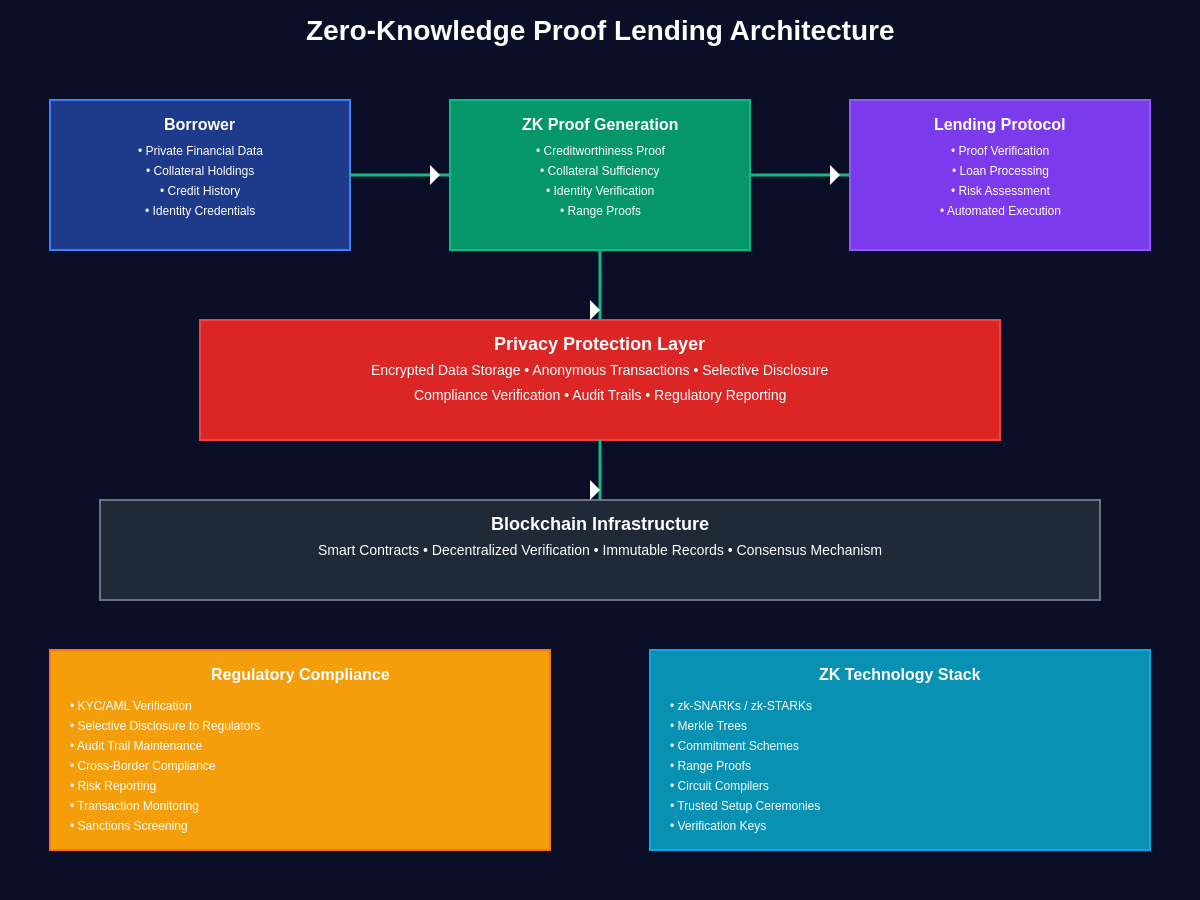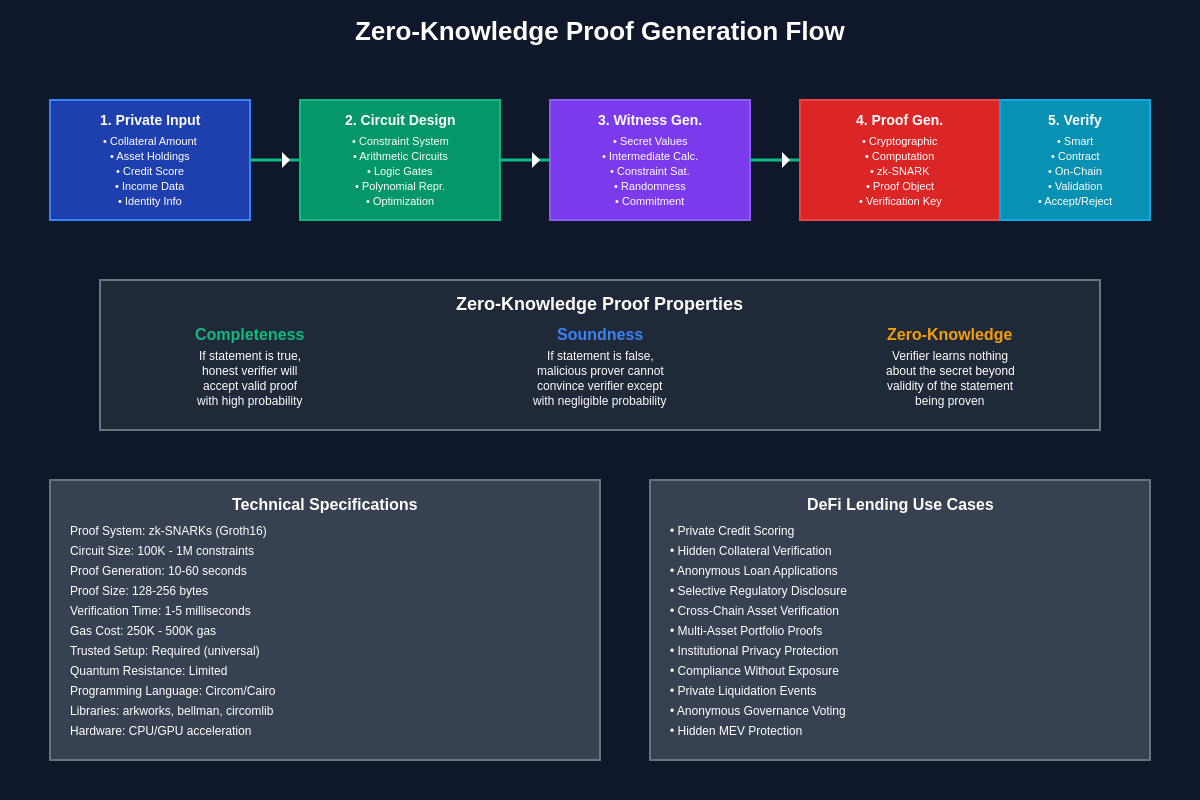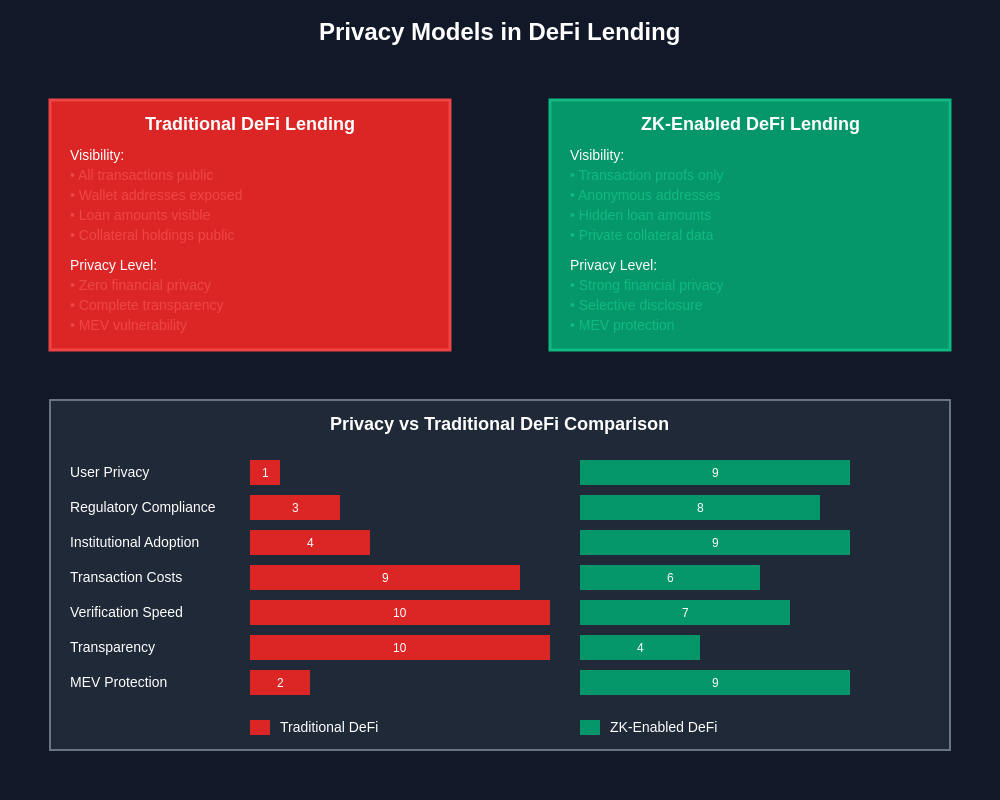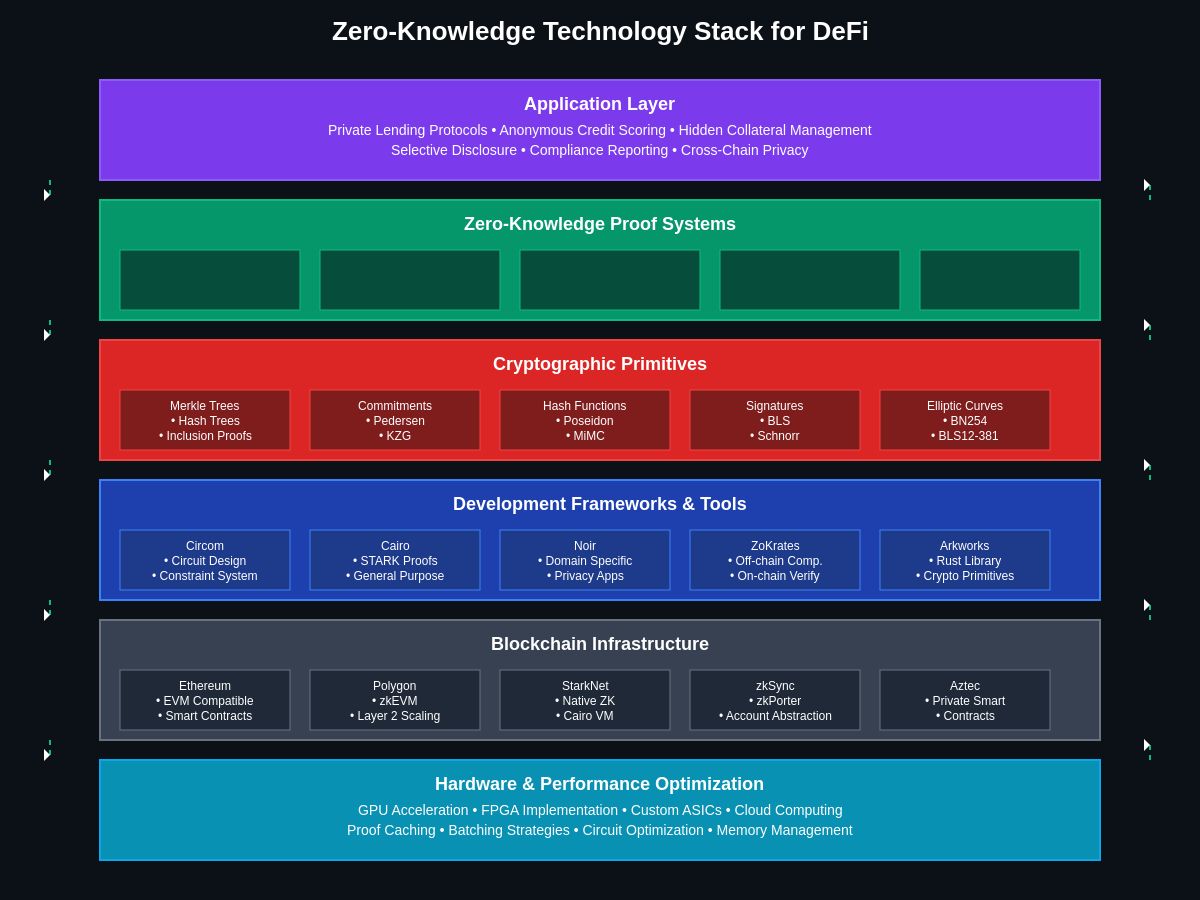The Privacy Revolution in Decentralized Finance
The decentralized finance ecosystem has experienced unprecedented growth, with total value locked reaching new highs, yet this expansion has exposed a fundamental limitation that threatens the long-term adoption of DeFi protocols: the complete lack of privacy in financial transactions. Every lending position, borrowing activity, and liquidation event on public blockchains remains permanently visible to anyone who cares to look, creating significant concerns for institutional participants and privacy-conscious users who require confidential financial operations while still benefiting from the transparency and trustlessness that makes DeFi attractive.
Access advanced privacy tools for DeFi analysis to understand market dynamics while maintaining operational security in your trading strategies.
Zero-knowledge proofs represent a revolutionary cryptographic technology that enables the verification of information without revealing the underlying data itself, offering a pathway toward private DeFi lending that maintains the security, transparency, and trustlessness of blockchain systems while protecting sensitive financial information from public observation. This technology promises to unlock institutional adoption of DeFi lending by addressing privacy concerns that have prevented large-scale participation while enabling new forms of financial innovation that were previously impossible in transparent blockchain environments.

The implementation of zero-knowledge proofs in DeFi lending protocols represents a fundamental shift from the current paradigm where all transaction details are publicly visible to a new model where only necessary information is revealed while maintaining cryptographic guarantees about the validity and integrity of financial operations. This advancement has implications far beyond simple privacy protection, enabling new business models, regulatory compliance frameworks, and institutional participation levels that could dramatically expand the total addressable market for decentralized lending protocols.
Historical Context and Evolution of Privacy in DeFi
The early development of DeFi lending protocols prioritized functionality, security, and composability over privacy considerations, with platforms like Aave, Compound, and MakerDAO building transparent systems where all lending positions, collateral ratios, and transaction histories remain permanently visible on public blockchains. While this transparency provided valuable benefits including auditability, market efficiency, and research capabilities, it also created significant barriers to adoption for users requiring financial privacy for legitimate business, personal, or security reasons.
Traditional financial systems have long recognized the importance of financial privacy, with banking regulations and industry practices designed to protect customer financial information while maintaining necessary oversight for regulatory compliance and risk management. The transition to blockchain-based financial systems initially represented a step backward in terms of privacy protection, with early DeFi protocols exposing financial activities that would be considered highly sensitive in traditional banking environments.
Early attempts to address privacy in DeFi focused primarily on privacy coins and mixing protocols rather than native privacy features within lending protocols themselves, creating a fragmented ecosystem where users had to choose between privacy and access to sophisticated DeFi lending features. These early privacy solutions often suffered from scalability limitations, regulatory concerns, and poor integration with existing DeFi infrastructure, limiting their practical utility for mainstream financial applications.
The recognition that privacy represented a critical missing component for DeFi lending protocols led to increased research and development efforts focused on integrating advanced cryptographic techniques including zero-knowledge proofs, secure multi-party computation, and homomorphic encryption into decentralized lending systems. These efforts have culminated in sophisticated privacy-preserving lending protocols that maintain the benefits of transparency and auditability while protecting sensitive user information from public disclosure.
Zero-Knowledge Proof Fundamentals in Financial Applications
Zero-knowledge proofs enable one party to prove to another party that they know specific information without revealing the information itself, a property that has profound implications for financial applications where verification of creditworthiness, collateral ownership, or payment capability must be demonstrated without exposing sensitive financial details. In the context of DeFi lending, zero-knowledge proofs can enable borrowers to prove their eligibility for loans without revealing their complete financial position, lenders to verify collateral without exposing asset holdings, and protocols to maintain proper collateralization ratios without making individual position details publicly visible.
The mathematical foundations of zero-knowledge proofs rest on advanced cryptographic concepts including polynomial commitments, elliptic curve cryptography, and various proof systems such as zk-SNARKs (Zero-Knowledge Succinct Non-Interactive Arguments of Knowledge) and zk-STARKs (Zero-Knowledge Scalable Transparent Arguments of Knowledge), each offering different trade-offs between proof size, verification time, trusted setup requirements, and quantum resistance. Understanding these trade-offs is crucial for implementing effective privacy-preserving lending systems that meet the specific requirements of different use cases and user populations.
Interactive and non-interactive zero-knowledge proof systems offer different advantages for DeFi lending applications, with interactive systems providing stronger security guarantees but requiring multiple rounds of communication between provers and verifiers, while non-interactive systems enable more efficient verification but may require trusted setup ceremonies or larger proof sizes. The choice between these systems significantly impacts the user experience, scalability, and security properties of privacy-preserving lending protocols.
Practical implementation of zero-knowledge proofs in DeFi lending requires careful consideration of circuit design, proof generation costs, verification efficiency, and integration with existing blockchain infrastructure. Monitor ZK protocol development and market performance to track the adoption of privacy-preserving technologies across different blockchain ecosystems. Modern zk-SNARK libraries and development frameworks have significantly reduced the complexity of implementing zero-knowledge proof systems, enabling DeFi developers to integrate privacy features without requiring deep cryptographic expertise.

Privacy-Preserving Lending Protocol Architecture
The architecture of privacy-preserving DeFi lending protocols must balance competing requirements including privacy protection, regulatory compliance, scalability, and composability with existing DeFi infrastructure. Successful implementations typically employ a hybrid approach where sensitive user information is protected through zero-knowledge proofs while maintaining necessary transparency for protocol operation, liquidation processes, and regulatory oversight.
Core components of privacy-preserving lending protocols include commitment schemes for hiding loan amounts and collateral values, zero-knowledge circuits for proving collateral sufficiency and creditworthiness, private communication channels for loan negotiation and terms agreement, and selective disclosure mechanisms that enable regulatory compliance without compromising user privacy. These components must work together seamlessly to provide a user experience comparable to traditional DeFi lending while offering enhanced privacy protection.
Collateral management in privacy-preserving lending systems presents unique challenges, as protocols must verify the existence and value of collateral without revealing specific asset types, quantities, or ownership details. Advanced cryptographic techniques including range proofs, set membership proofs, and homomorphic encryption enable verification of collateral sufficiency while maintaining privacy, though these techniques often require careful optimization to achieve acceptable performance and gas efficiency.
Smart contract architecture for privacy-preserving lending must accommodate the computational overhead of zero-knowledge proof verification while maintaining compatibility with existing DeFi infrastructure and enabling efficient liquidation processes when necessary. Layer 2 scaling solutions and specialized privacy-focused blockchains offer different approaches to managing the computational and economic costs associated with privacy-preserving financial operations.
Regulatory Compliance and Privacy Balance
The implementation of privacy-preserving DeFi lending protocols must navigate complex regulatory landscapes that vary significantly across jurisdictions, with some regions embracing financial privacy as a fundamental right while others require extensive transaction monitoring and reporting capabilities. Successful privacy-preserving lending protocols must incorporate selective disclosure mechanisms that enable compliance with applicable regulations while maintaining user privacy protection.
Regulatory compliance in privacy-preserving systems often requires sophisticated key management and access control mechanisms that enable authorized parties including regulators, auditors, and law enforcement agencies to access necessary information while preventing unauthorized disclosure of sensitive financial data. Zero-knowledge proofs can enable compliance verification without revealing underlying transaction details, satisfying regulatory requirements while maintaining user privacy.
Know Your Customer (KYC) and Anti-Money Laundering (AML) requirements present particular challenges for privacy-preserving lending protocols, as these regulations typically require extensive collection and verification of user identity information and transaction monitoring. Advanced cryptographic techniques including verifiable credentials, anonymous credentials, and privacy-preserving identity verification systems offer potential solutions that satisfy regulatory requirements while minimizing privacy exposure.
The development of regulatory frameworks specifically designed for privacy-preserving financial systems represents an ongoing process, with different jurisdictions taking varying approaches to balancing privacy protection with regulatory oversight. Track regulatory developments across global markets to understand how different regulatory environments may impact the adoption and implementation of privacy-preserving DeFi lending protocols.
Technical Implementation Challenges and Solutions
The practical implementation of zero-knowledge proofs in DeFi lending faces significant technical challenges including circuit design complexity, proof generation costs, verification efficiency, and integration with existing blockchain infrastructure. Modern development frameworks and optimization techniques have addressed many of these challenges, though significant engineering effort is still required to build production-ready privacy-preserving lending systems.
Circuit design for privacy-preserving lending applications requires careful optimization to balance functionality with efficiency, as complex financial logic can result in large circuits that are expensive to prove and verify. Techniques including circuit composition, lookup tables, and specialized arithmetic optimizations can significantly reduce the computational overhead of privacy-preserving financial operations while maintaining security and privacy guarantees.
Proof generation costs represent a significant consideration for user experience and adoption, as generating zero-knowledge proofs for complex financial operations can require substantial computational resources and time. Hardware acceleration, proof caching, and batching techniques can help mitigate these costs, while advances in proof system efficiency continue to reduce the computational requirements for privacy-preserving financial applications.
Verification efficiency is crucial for maintaining blockchain scalability and transaction throughput, as on-chain verification of zero-knowledge proofs must be fast and gas-efficient to enable practical deployment on existing blockchain networks. Recent advances in proof system design have dramatically reduced verification costs, making privacy-preserving financial applications economically viable on mainstream blockchain platforms.
Economic Models and Incentive Structures
The economic design of privacy-preserving DeFi lending protocols must account for the additional computational costs associated with zero-knowledge proof generation and verification while maintaining competitive interest rates and user experience compared to traditional transparent lending protocols. Successful implementations require careful consideration of fee structures, incentive alignment, and tokenomics that support the additional infrastructure required for privacy protection.
Interest rate models for privacy-preserving lending must account for the reduced transparency and market efficiency that may result from hiding loan volumes, utilization rates, and other market data that typically inform pricing mechanisms in transparent DeFi protocols. Advanced cryptographic techniques including secure multi-party computation and privacy-preserving analytics can enable market-driven pricing while maintaining user privacy protection.
Liquidation mechanisms in privacy-preserving lending systems present unique challenges, as traditional liquidation processes rely on public visibility of collateral ratios and position details to enable efficient price discovery and liquidator participation. Privacy-preserving liquidation systems must balance the need for efficient market-based liquidation with privacy protection requirements, often requiring sophisticated mechanism design and cryptographic protocols.
Token economics for privacy-preserving lending protocols may incorporate additional considerations including privacy mining rewards, proof generation subsidies, and governance mechanisms that account for the reduced transparency in protocol operations. Analyze DeFi token performance and lending rates to understand how privacy features may impact protocol valuations and user adoption patterns.

Risk Management in Private Lending Systems
Risk management for privacy-preserving DeFi lending requires sophisticated approaches that can assess and monitor risk without compromising user privacy, representing a significant departure from traditional risk management practices that rely heavily on transparent position monitoring and market surveillance. Advanced cryptographic techniques enable privacy-preserving risk assessment while maintaining the security and stability of lending protocols.
Credit risk assessment in privacy-preserving systems must rely on zero-knowledge proofs of creditworthiness rather than transparent analysis of borrower financial history and current positions. This approach requires development of new credit scoring models and risk assessment frameworks that can operate on encrypted or hidden financial data while providing reliable indicators of default risk and repayment capability.
Systemic risk monitoring represents a particular challenge for privacy-preserving lending systems, as protocols must maintain overall system stability and prevent cascading failures without having complete visibility into individual positions and market exposures. Privacy-preserving analytics and aggregation techniques can enable system-level risk monitoring while protecting individual user privacy, though these techniques often require careful design to prevent information leakage.
Liquidation risk management in privacy-preserving systems must account for the reduced efficiency and transparency of liquidation processes, potentially requiring higher collateral ratios or alternative risk mitigation strategies to maintain system stability. The development of privacy-preserving oracle systems and price feeds represents an ongoing area of research and development that will significantly impact the effectiveness of risk management in private lending systems.
Institutional Adoption and Enterprise Integration
The integration of privacy-preserving DeFi lending protocols with existing institutional financial infrastructure represents a significant opportunity for expanding the total addressable market for decentralized lending while addressing the privacy and compliance requirements that have prevented large-scale institutional participation in current DeFi protocols. Institutional users require sophisticated privacy protection, regulatory compliance capabilities, and integration with existing risk management and reporting systems.
Enterprise integration requirements for privacy-preserving lending include compatibility with existing custody solutions, integration with traditional banking and settlement systems, and support for complex organizational structures and approval processes. These requirements often necessitate additional privacy features including multi-party signatures, hierarchical access controls, and audit trails that maintain privacy while enabling necessary oversight and compliance.
Institutional risk management and compliance frameworks must be adapted to accommodate the unique characteristics of privacy-preserving lending systems, including reduced transparency, novel cryptographic security assumptions, and different regulatory compliance mechanisms. The development of institutional-grade privacy-preserving lending solutions requires close collaboration between DeFi developers, traditional financial institutions, and regulatory bodies.
The potential for privacy-preserving DeFi lending to unlock new institutional use cases including cross-border lending, asset-backed securities, and complex structured products represents a significant driver for continued development and adoption of these technologies. Monitor institutional adoption trends in crypto markets to understand how privacy features may accelerate institutional participation in decentralized finance.
Scalability and Performance Optimization
Scalability represents one of the most significant challenges for privacy-preserving DeFi lending protocols, as zero-knowledge proof generation and verification introduce substantial computational overhead that can limit transaction throughput and increase costs compared to traditional transparent lending systems. Advanced optimization techniques and scaling solutions are essential for achieving the performance levels required for mainstream adoption.
Layer 2 scaling solutions including optimistic rollups, zk-rollups, and state channels offer different approaches to improving the scalability of privacy-preserving lending systems, with each solution providing different trade-offs between privacy protection, transaction throughput, and cost efficiency. The choice of scaling solution significantly impacts the user experience and economic viability of privacy-preserving lending protocols.
Hardware acceleration for zero-knowledge proof generation represents an important optimization vector, with specialized hardware including GPUs, FPGAs, and custom ASICs offering significant performance improvements for proof generation tasks. The development of standardized acceleration frameworks and cloud-based proof generation services can help democratize access to high-performance privacy-preserving financial applications.
Batching and aggregation techniques can significantly improve the efficiency of privacy-preserving lending operations by amortizing proof generation and verification costs across multiple transactions. Advanced cryptographic protocols including recursive proofs and proof composition enable sophisticated batching strategies that maintain privacy while achieving better scalability than individual transaction processing.
Interoperability and Cross-Chain Privacy
The development of privacy-preserving lending protocols across multiple blockchain networks requires sophisticated interoperability solutions that can maintain privacy protection while enabling cross-chain asset transfers, lending relationships, and liquidation processes. Cross-chain privacy represents one of the most challenging technical problems in the privacy-preserving DeFi space, requiring coordination between different cryptographic systems and blockchain architectures.
Cross-chain bridge protocols for privacy-preserving systems must protect user privacy while enabling verification of asset transfers and maintaining security against various attack vectors including bridge exploits and cross-chain MEV attacks. Advanced cryptographic techniques including threshold signatures, secure multi-party computation, and cross-chain zero-knowledge proofs enable secure and private cross-chain operations.
Interoperability standards for privacy-preserving financial protocols are still in early development, with different projects taking varying approaches to privacy protection, proof systems, and cross-chain communication. The establishment of common standards and protocols will be crucial for creating a cohesive ecosystem of privacy-preserving financial applications that can interoperate seamlessly.
The potential for privacy-preserving lending protocols to enable new forms of cross-chain financial products including synthetic assets, cross-chain collateralized debt positions, and multi-chain yield farming represents a significant opportunity for innovation in the DeFi space. These applications require sophisticated privacy and security guarantees that span multiple blockchain networks and cryptographic systems.
Future Developments and Emerging Technologies
The future development of privacy-preserving DeFi lending will be driven by advances in cryptographic research, blockchain scalability solutions, and regulatory frameworks that better accommodate privacy-preserving financial systems. Emerging technologies including fully homomorphic encryption, quantum-resistant cryptography, and advanced proof systems promise to further improve the privacy, security, and efficiency of decentralized lending protocols.
Quantum computing represents both a threat and an opportunity for privacy-preserving financial systems, with quantum algorithms potentially breaking existing cryptographic assumptions while quantum-resistant cryptographic systems offer enhanced security guarantees. The development of quantum-resistant privacy-preserving lending protocols represents an important area of ongoing research and development.
Machine learning and artificial intelligence technologies offer significant opportunities for improving privacy-preserving risk assessment, credit scoring, and market making in decentralized lending systems. Privacy-preserving machine learning techniques including federated learning, differential privacy, and secure multi-party computation enable sophisticated AI-driven financial applications while protecting user privacy.
The integration of privacy-preserving DeFi lending with emerging Web3 technologies including decentralized identity systems, verifiable credentials, and self-sovereign identity frameworks promises to create more comprehensive and user-friendly privacy-preserving financial ecosystems. Stay updated on emerging blockchain technologies and market trends to understand how these developments may shape the future of private financial services.

Conclusion and Market Outlook
Zero-knowledge proofs represent a transformative technology for decentralized finance that addresses one of the most significant barriers to mainstream adoption: the lack of financial privacy in current DeFi protocols. The successful implementation of privacy-preserving lending systems has the potential to unlock massive institutional adoption while enabling new forms of financial innovation that were previously impossible in transparent blockchain environments.
The technical challenges associated with implementing privacy-preserving DeFi lending are significant but surmountable, with ongoing advances in cryptographic research, scaling solutions, and development frameworks continuously improving the feasibility and efficiency of these systems. The growing recognition of financial privacy as a fundamental requirement for institutional DeFi adoption is driving increased investment and development in this space.
Regulatory developments will play a crucial role in determining the adoption trajectory of privacy-preserving DeFi lending, with different jurisdictions taking varying approaches to balancing privacy protection with regulatory oversight requirements. The development of compliance-friendly privacy-preserving systems that satisfy regulatory requirements while maintaining user privacy protection will be essential for mainstream adoption.
The long-term market potential for privacy-preserving DeFi lending is substantial, with the ability to address institutional privacy requirements while maintaining the benefits of decentralized finance representing a significant competitive advantage. As the technology matures and regulatory frameworks develop, privacy-preserving lending protocols are positioned to capture a significant share of the growing DeFi lending market while enabling new use cases and user populations that require enhanced privacy protection.
Disclaimer: This article is for informational purposes only and does not constitute financial advice. Cryptocurrency investments and DeFi protocols involve significant risks including total loss of capital. Zero-knowledge proof systems and privacy-preserving technologies are experimental and may contain unknown vulnerabilities. Always conduct thorough research and consult with qualified financial advisors before making investment decisions. Past performance does not guarantee future results.